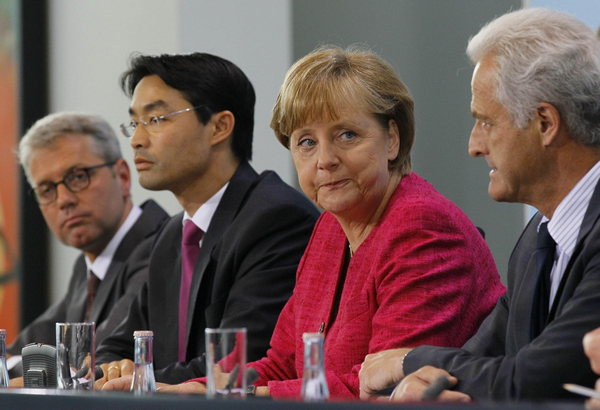Global General
Germany to shut all nuke plants: Merkel
(Xinhua)
Updated: 2011-05-31 11:28
 |
Large Medium Small |
|
 (L-R) German Environment Minister Norbert Roettgen, Economics Minister Philipp Roesler, Chancellor Angela Merkel and Transport Minister Peter Ramsauer address the media at a news conference on the report of the so-called Ethics Commission for a Secure Energy Supply in Berlin May 30, 2011. Germany will shut all its nuclear reactors by 2022, leaders of its ruling coalition agreed on Monday, in a reaction to Japan's Fukushima disaster that marks a drastic policy reversal and could still face stiff opposition.[Photo/Agencies] |
BERLIN-- German Chancellor Angela Merkel said on Monday that Germany could set an example in achieving a transition to efficient and renewable energies, after her government decided to close all 17 nuclear power plants in the country by 2022.
"We believe that we, as a country, can be a pioneer for a new age of renewable energy sources," Merkel said at a press conference hours after her coalition government drew up a nuclear phase-out timetable.
According to the ambitious plan, Germany's seven oldest reactors, which are taken off the grid following Japan's Fukushima disaster, will not be wakened up any time. The Kruemmel plant, which has been offline for years due to technical problems, will also be abandoned forever.
| ||||
The plan, which needs parliament approval, labeled Germany as the first major industrialized nation set to entirely abandon the atomic energy.
Germany could show to the world how a developed economy can achieve "such a transformation toward efficient and renewable energies, with all the opportunities that it has, for exports, development, new technologies and jobs," Merkel said.
"We will need a new architecture for our energy production," she added, acknowledging that Germany has to explore new sources for the vacancy left by the outgoing nuclear power, which currently accounts for 22 percent of the country's electricity production.
On Monday, the Federation of German Industry (BDI) expressed its worries, saying that the shutdown would force Germany to build more coal and gas power plants to stabilize the energy supply and price. As a result, it would lead to more greenhouse gas emissions.
"We don't only hope to give up nuclear energy by 2022, but also to reduce our CO2 emissions by 40 percent and double our share of renewable energies, from about 17 percent today to then 35 percent, " Merkel said.
Monday's decision was also seen as a return to the policy made by a previous Social Democrat-Green coalition government a decade ago. Last year, Merkel's coalition managed to extend the lifespan of nuclear power plants to around 2035, which was opposed by the majority of Germans and sparked rounds of protests afterwards.
Germany's anti-nuclear moods intensified after Japan's nuclear crisis starting in March. Merkel and her Christian Democrats had to change their pro-nuclear stance after suffering painful defeats in several local elections, including the one in Baden- Wuerttemberg, traditionally a stronghold for the conservatives.
| 分享按鈕 |

